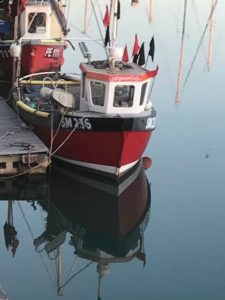The English Channel is not the Atlantic. It does not have the huge swell, with peaks so high and troughs so deep that you lose sight of boats making their gradual progress through heavy seas. It does not have huge waves, breakers that crash ashore on westward facing beaches. It does not have the surf that draws young people in Volkswagen Combis with their boards on the roof. It does not have the power or the terror of the immeasurable emptiness that lies between Cornwall and the New World. The English Channel can seem calm and domestic and unthreatening when compared with the vastness and danger of the ocean from which it flows, yet it is not benign.
A friend of my father had a speedboat on which we were once invited for a ride. A fifty-five horsepower outboard motor at the rear seemed an engine of wholly disproportionate power for the light plastic-hulled boat into which we stepped. Thoughts of skimming along the surface of the water, hardly noticing that we were crossing Lyme Bay, were quickly proven to be unfounded. We seemed to crash along, each wave encountered felt like a solid wall; there was a deafening sound from the engine and the successive impacts with the water. The sea through which I had thought we would skim had been something altogether different than I had expected.
Not only can the water be rougher than imagined, it can also seem a far greater distance to land when you are out in a small boat.
On the last day of one school summer holiday, my father and a group of friends had chartered a boat from Lyme Regis for a day’s fishing. We arrived at the Cobb armed with rods and lines and walked along to where the boat was tied up. An open, clinker-built boat, there was not so much as a wheelhouse; if it rained, we just got wet. It had an inboard engine and was steered with a tiller at the rear. The boatman was a diffident, weather-beaten man; his boat offered no comfort and he worked in times before lifebelts were considered a sensible option. We set out from the harbour and, whilst we can never have been more than a few miles distant from shore, our boat, which was probably no more than twenty feet long, seemed utterly dwarfed by the water all around us.
Anyone who makes their living by sailing alone into the dark and unpredictable waters of the Channel will always have my admiration.



I knew a guy in Galway through his son who was in college with me who married a Mayo woman but came from Dorset way, where he was on one of the old covered RNLI boats. Remember that cave rescue in the 90s. He said he was far far less fearful when going on a call on the Achill boat into the Atlantic than when he was on the English Channel on the waters you are speaking about. He had a few comments about the differences. Admirals of the Blue(weekend division) who assumed the seas were amenable to a combo of cash and utter ignorance ending up squawking as their investment sank about them being the worst. But the waters comment was odd I felt. You were ‘on’ the Channel but ‘in’ the Atlantic
The fishermen always seemed to take the sea far more seriously than the yachtsmen – perhaps from bitter experiences.